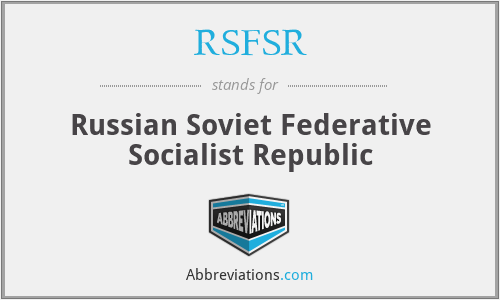What does RSFSR mean in Countries?
This page is about the meanings of the acronym/abbreviation/shorthand RSFSR in the Regional field in general and in the Countries terminology in particular.
Submitted by paul8539 on October 3, 2011
Translation
Find a translation for Russian Soviet Federative Socialist Republic in other languages:
Select another language:
- - Select -
- 简体中文 (Chinese - Simplified)
- 繁體中文 (Chinese - Traditional)
- Español (Spanish)
- Esperanto (Esperanto)
- 日本語 (Japanese)
- Português (Portuguese)
- Deutsch (German)
- العربية (Arabic)
- Français (French)
- Русский (Russian)
- ಕನ್ನಡ (Kannada)
- 한국어 (Korean)
- עברית (Hebrew)
- Gaeilge (Irish)
- Українська (Ukrainian)
- اردو (Urdu)
- Magyar (Hungarian)
- मानक हिन्दी (Hindi)
- Indonesia (Indonesian)
- Italiano (Italian)
- தமிழ் (Tamil)
- Türkçe (Turkish)
- తెలుగు (Telugu)
- ภาษาไทย (Thai)
- Tiếng Việt (Vietnamese)
- Čeština (Czech)
- Polski (Polish)
- Bahasa Indonesia (Indonesian)
- Românește (Romanian)
- Nederlands (Dutch)
- Ελληνικά (Greek)
- Latinum (Latin)
- Svenska (Swedish)
- Dansk (Danish)
- Suomi (Finnish)
- فارسی (Persian)
- ייִדיש (Yiddish)
- հայերեն (Armenian)
- Norsk (Norwegian)
- English (English)
Definition
What does RSFSR mean?
- rsfsr
- The Russian Soviet Federative Socialist Republic, Russian SFSR or RSFSR (Russian: Российская Советская Федеративная Социалистическая Республика, tr. Rossíyskaya Sovétskaya Federatívnaya Socialistíčeskaya Respúblika, IPA: [rɐˈsʲijskəjə sɐˈvʲetskəjə fʲɪdʲɪrɐˈtʲivnəjə sətsɨəlʲɪˈsʲtʲitɕɪskəjə rʲɪˈspublʲɪkə] (listen)), previously known as the Russian Soviet Republic and the Russian Socialist Federative Soviet Republic as well as being unofficially known as Soviet Russia, the Russian Federation or simply Russia, was an independent federal socialist state from 1917 to 1922, and afterwards the largest and most populous of the Soviet socialist republics of the Soviet Union (USSR) from 1922 to 1991, until becoming a sovereign part of the Soviet Union with priority of Russian laws over Union-level legislation in 1990 and 1991, the last two years of the existence of the USSR. The Russian Republic was composed of sixteen smaller constituent units of autonomous republics, five autonomous oblasts, ten autonomous okrugs, six krais and forty oblasts. Russians formed the largest ethnic group. The capital of the Russian SFSR was Moscow and the other major urban centers included Leningrad, Stalingrad, Novosibirsk, Sverdlovsk, Gorky and Kuybyshev. It was the first Marxist-Leninist state in the world. The economy of Russia became heavily industrialized, accounting for about two-thirds of the electricity produced in the USSR. By 1961, it was the third largest producer of petroleum due to new discoveries in the Volga-Urals region and Siberia, trailing in production to only the United States and Saudi Arabia. In 1974, there were 475 institutes of higher education in the republic providing education in 47 languages to some 23,941,000 students. A network of territorially organized public-health services provided health care. After 1985, the "perestroika" restructuring policies of the Gorbachev administration relatively liberalised the economy, which had become stagnant since the late 1970s under General Secretary Leonid Brezhnev, with the introduction of non-state owned enterprises such as cooperatives. On 7 November 1917 [O.S. 25 October], as a result of the October Revolution, the Russian Soviet Republic was proclaimed as a sovereign state and the world's first constitutionally socialist state guided by communist ideology. The first constitution was adopted in 1918. In 1922, the Russian SFSR signed a treaty officially creating the USSR. The Russian SFSR's 1978 constitution stated that "[a] Union Republic is a sovereign [...] state that has united [...] in the Union" and "each Union Republic shall retain the right freely to secede from the USSR". On 12 June 1990, the Congress of People's Deputies adopted the Declaration of State Sovereignty, established separation of powers (unlike in the Soviet form of government), established citizenship of Russia and stated that the RSFSR shall retain the right of free secession from the USSR. On 12 June 1991, Boris Yeltsin (1931–2007), supported by the Democratic Russia pro-reform movement, was elected the first and only president of the RSFSR, a post that would later become the presidency of the Russian Federation. The August 1991 Soviet coup d'état attempt with the temporary brief internment of President Mikhail Gorbachev destabilised the Soviet Union. On 8 December 1991, the heads of Russia, Ukraine and Belarus signed the Belovezh Accords. The agreement declared dissolution of the USSR by its original founding states (i.e., renunciation of the 1922 Treaty on the Creation of the USSR) and established the Commonwealth of Independent States (CIS) as a loose confederation. On 12 December, the agreement was ratified by the Supreme Soviet (the parliament of Russian SFSR); therefore the Russian SFSR had renounced the Treaty on the Creation of the USSR and de facto declared Russia's independence from the USSR itself and the ties with the other Soviet Socialist Republics. On 25 December 1991, following the resignation of Gorbachev as President of the Soviet Union (and former General Secretary of the Communist Party of the Soviet Union), the Russian SFSR was renamed the Russian Federation. The next day after the lowering of the Soviet red flag from the top of the Kremlin Senate building of the Moscow Kremlin in Moscow, the USSR was self-dissolved by the Soviet of the Republics on 26 December, which by that time was the only functioning parliamentary chamber of the All-Union Supreme Soviet (the other house, Soviet of the Union, had already lost the quorum after recall of its members by the several union republics). After the dissolution, Russia took full responsibility for all the rights and obligations of the USSR under the Charter of the United Nations, including the financial obligations. As such, Russia assumed the Soviet Union's UN membership and permanent membership on the Security Council, nuclear stockpile and the control over the armed forces; Soviet embassies abroad became Russian embassies.Th
Popularity rank by frequency of use
How popular is RSFSR among other acronyms?
RSFSR#1#23925#39933
Embed
Citation
Use the citation below to add this abbreviation to your bibliography:
Style:MLAChicagoAPA
"RSFSR." Abbreviations.com. STANDS4 LLC, 2024. Web. 31 Oct. 2024. <https://www.abbreviations.com/term/558766>.



Discuss this RSFSR abbreviation with the community:
Report Comment
We're doing our best to make sure our content is useful, accurate and safe.
If by any chance you spot an inappropriate comment while navigating through our website please use this form to let us know, and we'll take care of it shortly.
Attachment
You need to be logged in to favorite.
Log In